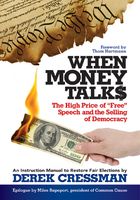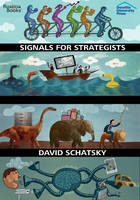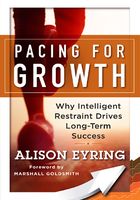FRIENDS, READERS, STUDENTS OF RHETORIC, WOULD-BE ORATORS: LEND ME YOUR EARS.
Please understand—that is only a metaphor. "Your ears" is a figure of speech; all I seek is your attention to speeches by historic figures.
That little rhetorical antithesis—figure of speech, speech by figures—is known as a contrapuntal turnaround. Lincoln used the device in switching the cynical "might makes right" to the moral "right makes might"; John Kennedy did the same with never negotiating out of fear, but never fearing to negotiate. That's the way some phrasemakers do their thing—we contrapunt and pray—to provide a speech with some quotable nugget. Since the 1970s, as speeches were recorded on tape, they have been known as sound bites.
But, sound bites and zingers, aphorisms and epigrams, are for quotation anthologists. The study of one-liners is engaging if you like the smorgasbord or quick review, but here we offer the meat and potatoes of oratory—oral communication in context, human persuasion in action.
To stir the blood of patriots, we have Daniel Webster reminding us of the meaning of sacrifice at Bunker Hill; we have Judge Learned Hand transcending superpatriotism on "I Am an American Day"; we have Douglas MacArthur calling West Point cadets to "duty, honor, country."
To sound the clarion of war, we have the virgin queen, Elizabeth I, defying the Spanish Armada; we have Patrick Henry (or Judge St. George Tucker, who may have coined the phrase in retrospect) crying, "Give me liberty, or give me death"; we have Winston Churchill, in Britain's finest hour, calling for "blood, toil, tears, and sweat."
To honor the memory of our illustrious dead, we have Henry Lee's tribute to the man who was "first in war, first in peace"; and we have John F. Kennedy using his eulogy at the funeral of poet Robert Frost to pay tribute to the arts in America.
To recall the clash of hot debate, we have Cicero lashing into Catiline; we have Stephen Douglas's reply to Lincoln, and portions of the first televised confrontation between presidential candidates.
To watch the accused reach heights of defiance against injustice, we have Irish rebel Robert Emmet warning his sentencers, "Let no man write my epitaph"; we have Gandhi of India professing his religious faith in a secular court; we have dissident Anatoly Shcharansky expressing his contempt of his Communist judges.
To see how powerful figures best take their leave, we hear Socrates before taking the hemlock; we hear abolitionist John Brown foreseeing the blood of civil war; we hear the simple good-bye of first baseman Lou Gehrig at Yankee Stadium; we hear Dwight Eisenhower startle his old friends with a warning about a "military-industrial complex."
To stir our soul, we listen to Jesus' Sermon on the Mount; Lincoln's curious sermon at his second inaugural; Rabbi Louis Finkelstein at the White House; and Billy Graham preaching the gospel.
To enrich and uplift our spirit, we have Louis Pasteur on education; Mark Twain on stage fright; Senator Everett Dirksen on his beloved marigolds; William Faulkner on how mankind will not merely endure but prevail. We have Secretary of State Dean Acheson present at the creation of the Cold War and Boris Yeltsin at its effective end.
Nor is that all; we are not limited to political figures. To stretch the mind, we have Edgar Allan Poe explaining the poetic principle; Frank Lloyd Wright on the flight of the floo floo bird through the backward-looking world of architecture.
But what of the burning issue of social justice? To stir our conscience, we have Lord Byron on the rights of labor; populist Huey Long and his "Every Man a King"; Margaret Chase Smith on the conscience of a senator; and Czech dissident become president Václav Havel on improvement politics as "the art of the impossible."
We dare not neglect the media. Here you will find a calculated cacophony, from Newton Minow's warning of a "vast wasteland" to Spiro Agnew's blast at the "instant analysts"; from Norman Mailer and Salman Rushdie on the rejection of intimidation to an extemporaneous rumination by Daniel Schorr on the ambiguities of news suppression.
And now to the mother's milk of this anthologist, the political speech. Here is Demosthenes showing how to mount a defense by savaging his attacker; Edmund Burke on conciliation with America; FDR's first inaugural, Truman's stump speech, Goldwater on vice and virtue, Khrushchev's secret speech on Stalin's cult of personality, Nixon's "silent majority," Barbara Jordan at the Watergate hearings, Reagan on the "evil empire," Bush's "thousand points of light," as well as Judge Soggy Sweat's drily damp evocation of fence straddling in his "if by whisky" speech.
We will conclude on a note of hope, with the advice of leaders to students at commencement. Woodrow Wilson inspires the midshipmen, and editor William Allen White challenges the generation about to fight a world war; Art Buchwald kids them, Mario Cuomo instructs their parents, and Lane Kirkland warns them, in the words of his favorite western villain, "life ain't going to be like anything you ever heard of before."
That survey of contents is an appetizer for our feast of oratory. But before plunging in, you will want to know what turns an everyday expression of views into more than a respectable address—into a "great speech."
Ambassador Robert Strauss likes to start his addresses this way: "Before I begin this speech," he says, "I have something to say." Before beginning the instructive part of this introduction (composed in a style to make it possible for the reader to declaim in a stentorian tone), I want to make a point: there are secrets to speechwriting and speechmaking that you can learn and use. Dip into this book often enough, and you will get the hang of them. Here is how to acquire eloquence by osmosis: close the door, or go out in the woods with only a dog as an audience, and read these speeches aloud. Even the dog will profit, especially from Senator Vest's tear-jerking but immortal "tribute to a dog."
Now to my theme: the ten steps to a great speech. One of the criteria in selecting the speeches herein is shapeliness. Most people associate shapeliness with the female form or masculine physique, but those of us in the rhetorics dodge—students or practitioners of persuasion—think of shapeliness as necessary forensic form, the configuring contours of communication.
That's because a great speech—even a good speech—must have a structure, some thematic anatomy. "Tell 'em what you're going to tell 'em; then tell 'em; then tell 'em what you told 'em." That simple organizing principle is the primary adage of speechmaking. That old saying, you note, is packaged in perfect oratorical style; the imperative mood, the force of a command, the parallel structure that invites a rhythm in delivery. None of that pompous "The well-crafted speech should begin with an introductory survey of content to come and conclude with a summary of main points." At meetings of the Judson Welliver Society, the association of former White House speechwriters, you can hear a low buzz in the room between after-dinner toasts. It is the distinguished membership murmuring the mantra, "Tell them what you're going to tell them; then tell them; then tell them what you told them." We know whereof we speak. Take it from the fast-shuffling old pros: graceful organization—shapeliness—is the second step to a great speech.
(Wait a minute; what was the first step? That was "Shake hands with your audience." I did that with the Bob Strauss line. Make the first step a quickstep; get your smile, then get to work.)
A skeleton needs life. Beyond structure is pulse. A good speech has a beat, a changing rhythm, a sense of movement that gets the audience tapping its mind's foot. (If the mind can have an eye, it can have a foot; every metaphor can be extended.) If there is one technique that orators down the ages have agreed to use, it's anaphora, the repeated beginning. Here's Demosthenes: "When they brought… suits against me—when they menaced—when they promised—when they set these miscreants like wild beasts upon me…." Here's Jesus: "Blessed are the poor in spirit…. Blessed are the meek…. Blessed are the peacemakers…." Here's JFK: "Let both sides explore…. Let both sides seek…. Let both sides unite…." Don't knock this obvious parallelism: It sings. It excites. It works.
What else makes a great speech? Occasion. There comes a dramatic moment in the life of a person or a party or a nation that cries out for the uplift and release of a speech. Someone is called upon to articulate the hope, pride, or grief of all. The speaker becomes the cynosure, the brilliant object of guidance; he or she is all alone out there on the cusp, and the world stops to look and listen. That instant access to fame gives the edge to an inaugural address, or to a speech on some state occasion or award ceremony; the occasion, by being invested with solemnity or importance, boosts the speech itself. Some great occasions are frittered away with pedestrian addresses, as in Jimmy Carter's inaugural or in Nelson Mandela's speech thanking the dais upon his release from a lifetime ordeal in a South African prison; neither is included here. But other memorable occasions are made immortal by the words said at them: Lincoln's poem at Gettysburg is worth close analysis, not simply recitation by rote; and Martin Luther King's "I have a dream today" is worth rereading in its entirety, and not just taken in sound bites on anniversaries.
An idea closely related to occasion is "forum," from the Roman place of speechifying. When I was writing speeches in the White House, I had a perfect forum: the Oval Office, which is now a permanent television set. Using this setting, a president must explain rather than declaim; the technique of televised speechmaking is to speak to an audience of one. That calls for a conversational tone, even though the conversation is a monologue, and a seriousness of expression; not even Ronald Reagan, the most adept television speaker, smiled much in the course of a speech from his desk. It also calls for a short, intense speech, twenty minutes tops; tuning out, mental or physical, becomes rampant as attention spans shorten. When the speaker wants to exhort or solemnify, or add a sense of occasion to the forum, or cover a lot more than one subject, he takes the cameras out on location. That's when we see the State of the Union address making a prop of Congress, or a "convention speech" outlining a vision of America. On these occasions, the speaker must decide whether to speak to the people in the hall or to look at the camera and try to reach the people at home; I've always felt that a great-hall speech should be directed to the people on the scene, leaving the viewer at home with the sense of being an onlooker once removed; the recipient takes in the speech as an event to be observed and feels not like the specific target of the speaker but like an extension of a vast audience. One-on-one sells; one-on-a-million thrills.
To the handshake, shape, pulse, and occasion or forum, add the fifth step: focus. A "great" speech need not start out great and stay great all the way through to a great finish. It should first engage the interest, and allow a dip for the audience to get comfortable as the speaker works his way into the theme; then it should build toward its key moment well ahead of the peroration. Here is how political economist John Stuart Mill defined the art of the orator: "Everything important to his purpose was said at the exact moment when he had brought the minds of his audience into the state most fitted to receive it."
Note the word "purpose." A speech should be made for a good reason. No worthy speech was ever made to sound off, to feed the speaker's ego, to flatter or intimidate the crowd. Fidel Castro makes that kind of speech, running to seven hours long, and no rhetorical ramble of that sort is honored by inclusion here. Why not? Because a great speech is made for a high purpose—to inspire, to ennoble, to instruct, to rally, to lead.
What about quotation in a speech? In the past, orators occasionally studded their rhetoric with references to ancient Greeks, but now quotation seems to be a must. Usually it is tossed in to show a little erudition, a crutch when a speech is limping along and needs a touch of class. I did that a moment ago with John Stuart Mill; his point about preparing the audience for the message is apt, but it doesn't sing; I should have stolen his idea and phrased it more forcefully. If I'd felt I had to use a direct quotation, I should have found a dramatic context. Richard Nixon, closeted in a small room off the Oval Office, used to tell his speechwriters, "Never give me a naked quote. Put it in a little story." He was right. Try this: John Stuart Mill loved a woman for twenty years, but she was married; only when her husband died did the philosopher have the chance to marry the widow who had been his lifelong inspiration. Harriet Mill helped teach her inarticulate new husband the art of oratory. They worked together on his masterpiece, On Liberty, but she died before it was published; the heartbroken philosopher dedicated it to the woman he had waited for, loved, and lost, and in an article about oratory, he must have remembered what she told him: "Everything important to his purpose…." There you have a little story, a utilitarian trick to put a little flesh on the bones of quotation.
Are all the speeches herein "great" speeches—thrilling, profound orations delivered on momentous occasions? Of course not. Some are merely famous speeches. Mark Twain on speechmaking is humor on wry. Kissinger on isolationism won't knock your emotional socks off; in fact, any speech by a living politician is hard to categorize as "great" until the speaker is elevated to iconhood, dispatched down to Gehenna, or dead. Some of the speeches herein were chosen because they are representative of an era or a style, or instructive to modern orators: Malcolm X's incendiary words are not "great" in the sense of being timeless or majestic, but they contain a persuasive passion.
On the other hand, not every great speech is a good speech. What Harry Truman's stump speech lacks in depth and shape, it makes up for in zest. What Jonathan Edwards's sermon lacks in grace, it delivers in hellfire. In this anthology, the ultimate criterion in what makes a speech great is whether I think it's great. Do not be shocked by that subjectivism: oratory is an art, not a science, and a great rhetorician may choose to grab, slug, inspire, provoke, or tickle. Whatever tone the orator chooses, if he wants to make a memorable speech, he should make a phrase.
Phrasemaking is easy. Suppose you want to enliven a speech about the division of a continent. Think of a metaphor about division; how about the asbestos sheet that is lowered onto the stage to separate the audience from fire backstage? It's called an iron curtain. Go ahead, the metaphor may be trite, but give it a shot. And you can use it derivatively: if you're writing about China, boost the analogy to a bamboo curtain, or, in a rousing speech to an underwear convention, a lace curtain. If you're unwilling to let a simile be your umbrella, there's always alliteration: "not nostrums but normalcy" (a catchier word, by the way, than "normality") or the "nattering nabobs of negativism." If you're really stuck, put "new" in front of any grand noun, and capitalize the phrase: it worked with "nationalism," "freedom," "deal" "frontier," and "world order," and it can work for you.
To the mix of welcome, structure, pulse, forum, focus, phrase, and purpose, add this single most important ingredient: theme. In the end, you must answer in a word or sentence the question of the person who couldn't be there: What was the speech about? Churchill, in the radio talk that coined a phrase that was transmuted into "blood, sweat, and tears," made a speech about sacrifice. He was the one who faced a sloppy dessert and said, "Take away this pudding: it has no theme," The speech you are reading now is about how to judge a great speech. I have that theme clear in my mind; if you do not discern that as my theme, this is not much of a speech.
Delivered by Demosthenes, however, even this modest effort would seem like a great speech. In a story perhaps apocryphal, his countryman Pericles, who also had a reputation as an orator, made this admiring comparison: "When Pericles speaks, the people say, 'How well he speaks.' But when Demosthenes speaks, the people say, 'Let us march!'" Ronald Reagan's delivery could lift a bad speech up by the scruff of its neck, shake it, and make it sing. Contrariwise, the best-written speech can fall on its face if poorly delivered. There is the old chestnut about the Texan striding along Fifty-seventh Street in Manhattan who asked a stranger, "Tell me, partner, how do I get to Carnegie Hall?" and the stranger replied, "Practice, practice." Delivery is the final step to eloquence; it requires practice, discipline, drill, and you can be your own personal trainer. You develop the self-confidence that puts an audience at ease, or sits them up; your eye is in contact with the people, not the page; your joy in your job is contagious.
Woodrow Wilson was originally a political-science professor, and his lecture delivery matched his stilted writing. But Wilson labored to overcome the professorial style. His earliest writing was about orators and their oratory. He founded the debating society at Princeton and added debate coaching to his teaching; he declaimed in the woods; he set out to defeat his natural inclinations to aloofness and reserve. Ultimately, as he got better at it, the future president gained confidence in himself and wrote to his fiancée, "I enjoy it because it sets my mind—all my faculties—aglow; and I suppose that this very excitement gives my manner an appearance of confidence and self-command which arrests the attention. However that may be, I feel a sort of transformation—and it's hard to go to sleep afterwards." Later, in an essay on the oratory of William Pitt the Elder, Wilson wrote, "Passion is the pith of eloquence."
And on delivery, caveat stentor: when preparing a speech, beware of undeliverable words. "Undeliverable" is one such tripword; it may look easy enough on the page, and it may be easy to pronounce in the mind when read silently, but when the moment comes to push it past your lips, such a word invites a stumble. And if you practice a tripword out loud, and put a check mark over it in your text, you will be all the more sure to stumble. As a young speechwriter, I drafted remarks for New York City's official greeter, whose assignment was to welcome Syngman Rhee of South Korea. I referred to the visiting president's "indomitable will"; the greeter, a bumbling former ambassador, knew he would say something like "indomatabubble" and asked for a synonym. When I gave him "indefatigable," he fired me on the spot; somebody else had to slip him "steadfast." In retrospect, I now see I was intransigent. (That's my penance: in reading this aloud, I will surely stumble over "intransigent.") Embrace the thin word; eschew the fat.
Beware, too, of words that may vaguely trouble your listeners. A moment ago, I quoted Wilson saying, "Passion is the pith of eloquence." I know what "pith" means—"nub, core, quintessence"—and so do you. But I would never stand in front of an audience and say "pith"; it sounds like a vulgar word being spoken with a lisp. Nobody would criticize you for it, but you as the speaker or speechwriter are responsible for preventing those little internal winces in the minds of your listeners. They distract attention from the message you want to get across. While we are on the subject of troubling vocabulary, observe how the great speeches steer clear of forty-dollar words. Big words, or terms chosen for their strangeness—I almost said "unfamiliarity"—are a sign of pretension. What do you do when you have a delicious word, one with a little poetry in it, that is just the right word for the meaning—but you know it will sail over the head of your audience? You can use it, just as FDR used "infamy," and thereby stretch the vocabulary of your listeners. But it is best if you subtly define it in passing, as if you were adding emphasis—as I did a moment ago, with "cynosure, the brilliant object of guidance." Who knows that a cynosure is a constellation in the heavens that sailors steered by, even among those who use the cliché "cynosure of all eyes"? Who will know what "deltoids" are, when I refer to them in a moment? The speaker will; if he subtly helps his audience, nobody should notice the medicine go down.
I admit that what you have in your hands is a heavy book. Intellectually weighty, too, but the meaning I have in mind is "hefty"—2.4 pounds, to be exact—nothing to slip into pocket or purse on your way to a speech doctor's office. "This I freely assert," said the verb-conscious Franklin Roosevelt, "and I hope my friends in the press do not change that to 'admit.'" The weight of this book is a boon to both mental and physical health. I once received a thick anthology from Sidney Perelman, the great humorist—it was called The Most of S. J. Perelman—and the inscription read, "To William Safire, together with a small jar of antiphlogiston to rub on his deltoids, should you read this compendium in bed." That sent me to the dictionary: "the deltoids" are the book-holding muscles of the shoulder and Antiphlogiston was the name of a soothing ointment that was rubbed out by Ben-Gay. I pick up Perelman's big book now and then; lifting it gives me a lift, as I hope this volume will do for you. (It would have been lighter but for the stream of speeches brought in by my chief of research, Jeffrey McQuain, and my editorial aide, Ann Elise Rubin; thanks, too, to Jeanne Smith of the Library of Congress, and to Professor Janet Coryell for hard-to-find speeches by women, and to Gerald Howard and Emma Lewis from W. W. Norton, the intrepid publishers. We have just saved a page of acknowledgments.)
You are now an abnormally sophisticated audience. You know the tricks of the speech trade, some of the devices of the phrasemaker and speechwriter, and you expect the speaker now to summarize—to tell 'em what he told 'em.
Sorry; there's a secret eleventh step: cross 'em up now and then. This is, after all, a speech meant to be read, not spoken; the metaphoric listener is really a reader who can skip back as no real listener easily can. You, dear speech reader, are lending not your ears but your eyes, which are much more perceptive and analytic organs. After receiving the moral directions summarized on the tablets he brought down from Mount Sinai, Moses spoke to the people of Israel—but nowhere is it written that he found a need to summarize the Ten Commandments.
What every audience needs, however, is a sense of completion; what the speaker needs is a way out on a high note. That's a necessary ingredient to shapeliness. That calls for a peroration.
A peroration, my friends, is a devastating defense against the dread disease of dribbling-off. It should start with a quiet, declarative sentence; it should build in a series of semicolons; it should employ the puissance of parallelism; it should make the farthest rafter reverberate with the action and passion of our time, and—throwing aside all rules of short sentences or self-quotation—it should reach into the hearts and souls of a transfixed humankind to say, "This—this!—is the end of the best damned speech you've ever had the good fortune to experience." (Sustained applause, punctuated by "Bravo!" "Let us march!" and "You tell 'em, Buster!"—followed by some smart-aleck pundit wrinkling his nose and wondering aloud, "But what did he really say?")














